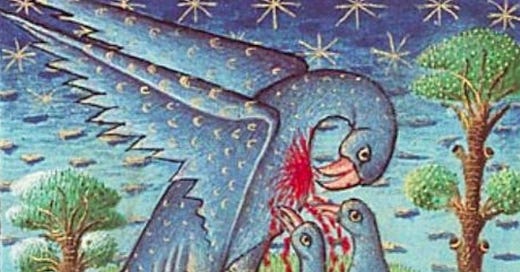Psalm 102 is one of those great howls from the darkness that makes the Psalter such a dazzling kaleidoscope of moods and meanings. Those of us who pray the Liturgy of the Hours daily often find it speaks to us in our particular moments, and addresses our individual struggles.
Like many people today, I deal with depression, and I find that the Psalms are an effective way of finding my voice in the darkness. I know that I do not have to carry alone what in truth I could never carry alone. (1) All suffering throughout all time was nailed to the cross with Christ, and so through our contemplation and prayer, we can lay our inner darkness at its foot.
Augustine read the Psalms Christologically, each as though it were spoken by or about Christ. It’s a good exercise when meditating on the Psalter.
The passage from Psalm 102 that gives this page its title is translated different ways, but my favorite is:
I am like a pelican in the wilderness,
Like an owl among the ruins.
I lie awake;
I am like a lonely sparrow on the housetop.
The identity of animals in the Hebrew Bible is often uncertain, but the Septuagint’s use of pelican was fortuitous. In Christian bestiaries, the bird was said to open its breast to feed its offspring on its own blood, so it took on a eucharistic symbolism.
The owl was a nightbird, sometimes considered a carrion bird and therefore unclean. It suggests darkness and loneliness, and yet it sometimes appears as a tender mother, as in Isaiah 35:15.
The owl will nest there and lay eggs,
she will hatch them, and care for her young
under the shadow of her wings;
Her young find safety in the shadow of wings. Thus, the darkness is not just a domain of evil, but a refuge created by a loving mother. A darkness where love is found.
Augustine took a stab at multiple interpretations of the passage in his Enarrations (some successful, some less so), but in his final attempt he found the Christological heart of the Psalm:
Christ is represented by the pelican in his birth, by the owl in his dying, and by the sparrow in his resurrection. At his birth he is solitary, because he alone was born so; in his suffering he is surrounded by ruined walls, slain by those who could not stand stable in his building. On awakening from death he flies alone to the roof—that is, to heaven—where he intercedes for us; for our head is the sparrow, and his body the turtle-dove, as another psalm has it: The sparrow has found himself a home. What home is this? He is at home in heaven, there to make intercession for us. But that other psalm continues, And the turtle-dove a nest, for the Church of God has found a nest, made out of twigs from the wood of his cross, where she may place her squabs (Ps 83:4(84:3)), her little ones. I kept watch, and became like a sparrow alone on a roof. (2)
Read the rest of the Psalm to see how alternating passages of lamentation and rejoicing acknowledge the suffering of the psalmist, while extolling the greatness of God, and his ultimate triumph.
Whoever voices this Psalm–David, Christ, you–it takes us on a journey through the depths of suffering, repentance, prayer, mercy, and finally, an eschatological hope.
1. Benedict XVI. Homilies of His Holiness Benedict XVI (English). Vatican City: Libreria Editrice Vaticana, 2013.
2. Saint Augustine, Expositions of the Psalms 99–120, ed. Boniface Ramsey, trans. Maria Boulding, vol. 19, The Works of Saint Augustine: A Translation for the 21st Century (Hyde Park, NY: New City Press, 2003), 54–55.




